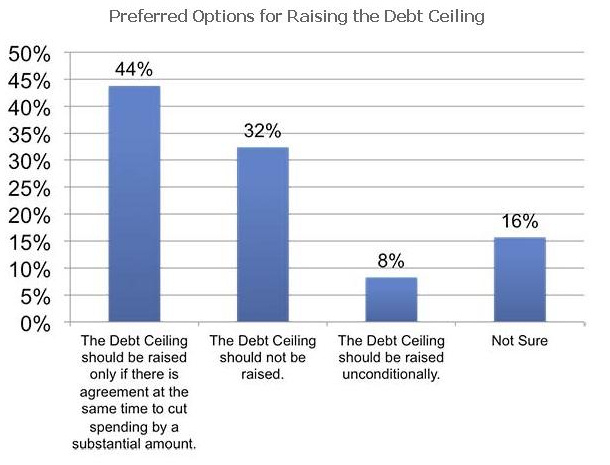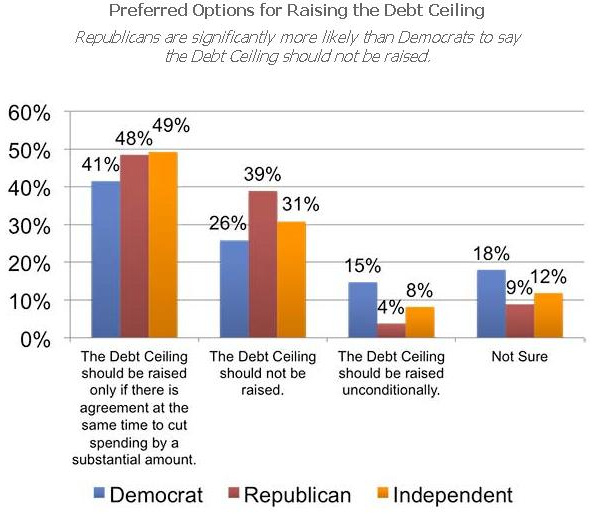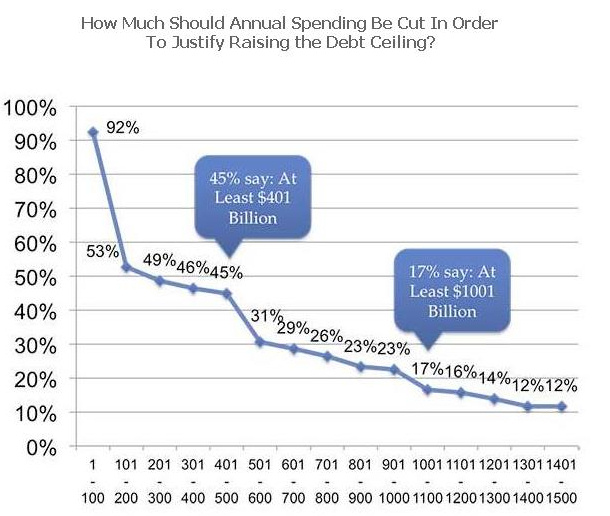
Listen up Congress! People want debt fixed
More Recent Stories
- U.S. MILITARY WARNS OF PLOT BY FEDERAL RESERVE BANKERS TO HAVE CIA MERCENARIES FROM LIBYA KILL NEW YORK COPS
- April 29, 2024 : UPDATE TO FOURWINDS READERS
- AMERICA HASN'T LEARNED A THING: Racism, Materialism and Militarism Still Reign Supreme
- UPDATE: TO FOURWINDS READERS January 13 2023
- A PRAYER FOR AMERICA
Help Us Grow
Like Us On Facebook and Follow Our Posts
Most Emailed
A new poll shows that one third of Americans say the debt ceiling should not be raised under any circumstances – a move that would force the federal government to slash hundreds of billions from its spending more or less starting today.
And an even larger segment, 44 percent, responded in the PJ Institute poll that they would allow the ceiling to be raised – but only if there would be spending cuts that range up to $1.5 trillion. A full 17 percent said the cuts should total at least $1 trillion.
The institute worked with Survey Sampling International to conduct an online survey of 1,000 U.S. adults with a margin of error of plus or minus 3 percentage points.
Only 8 percent say the debt ceiling should be raised without stipulations.
"Americans understand that our nation is broke and that it's far past time to get our fiscal house in order," said Laurence Kotlikoff , Boston University economics professor and consultant on PJI's economic initiatives.
"The meager budget cuts made in recent months are a travesty coming after years of massive spending hikes and tax cuts. Almost half of U.S. households appear to want real fiscal change through spending cuts as a precondition to further government borrowing. Unfortunately, Americans have lost confidence in Congress' ability to follow through on economic reform and view pledges of future, post-election budgetary restraint as very cruel jokes played on our children."
 Preferred options regarding debt ceiling |
The research and education division of Pajamas Media said its analysis concludes that the "tipping point" for American debt could be reached in 2017. That's point is not when the debt ceiling is reached – it's expected any hour now.
That would be the time when federal debt could exceed 90 percent of gross domestic product and the nation "might not be able to borrow money to finance its spending."
The analysis was based on forecasts, both long- and short-term, from the Congressional Budget Office.
The survey revealed that while more Republicans believe President Obama's Mastercard should be canceled immediately, a higher percentage of independents said there should be no increase in the debt ceiling without "substantial" cuts in spending.
Even 26 percent of Democrats would cut the plastic charge card into pieces right now, while only 15 percent of Democrats said the ceiling should be increased without qualifications.
Only 4 percent of Republicans and 8 percent of independents were in that category.
 Preferred options for raising debt ceiling |
The "shut-off-the-spigot-now" crowd included 31 percent of independents and 39 percent of Republicans. The demographic that wants the spending cut substantially in order for more borrowing to take place included 41 percent of Democrats, 48 percent of Republicans and 49 percent of independents.
The institute, which provides in-depth analysis on a variety of topics from the economy and personal finance to history, said, "When it comes to our personal finances, we know that we can only go so far into debt before we 'max out' our credit card."
The report continued, "At that point, lenders charge higher interest rates, refuse to extend additional credit and cut existing credit lines. … The same applies to government debt. There are limits to how much the U.S. government can borrow to finance its spending."
 How much should spending but cut? |
"Economists and financial service companies have been warning Americans about the point at which the nation's borrowing power will evaporate, and a recent survey by the PJ Institute shows that Americans have been listening," the report said.
"Before Americans can justify raising the nation's debt ceiling, they are looking for significant cuts in government spending," the analysis found. It also discovered that young people, ages 18-34, showed more support for not raising the debt ceiling "under any circumstances" than for raising it with spending cuts.
"Americans who preferred to raise the debt ceiling only if substantial spending cuts are made defined those 'substantial cuts.' Specifically, 45 percent say more than $400 billion worth of spending cuts is substantial. Nearly one in five (17 percent) define substantial as exceeding $1 trillion in spending cuts," the poll revealed.
Weeks ago, when a "No More Red Ink" campaign was launched to target House Republicans with constituent requests to freeze the nation's debt ceiling and force huge spending cuts, campaign organizer Joseph Farah of WND.com was a lone voice in the wilderness.
Today, the chorus discussing the idea includes media such as the Hill, the Washington Post, National Journal, the Atlantic Wire, the Washington Examiner, Politico, Talk Radio News Service, Americans for Tax Reform, U.S. News and World Report, the New Republican, Kaiser Health News, U.S. Politics Today and the Washington Times – and those are just the ones in Washington.
Hundreds of reports and commentaries now are raising awareness that by simply refusing to raise the debt ceiling, House Republicans could force huge spending cuts that would begin to curb the size of the federal government.
The organizer of the "Red Ink" campaign says it really isn't that complicated: GOP candidates were elected to Congress in 2010 because voters wanted the federal borrowing and overspending to halt. He said 2011 may represent America's last chance to change directions on reckless spending and borrowing policies. He points to a number of other polls also showing Americans opposed to increasing the debt limit by overwhelming numbers.
He said the House Republican majority has it within its own power, without any Democrats helping, to stop the borrowing and spending.
The national debt ceiling is about $14.3 trillion, and officials expect the country's current pace of borrowing to reach that figure at any time now.
The "Red Ink" campaign explains that House GOP members alone – with no cooperation from the Senate or White House – could bring the borrowing to a halt by refusing to authorize an increase. They can do this simply by not voting to raise the debt ceiling. The result would be significant spending cuts by the federal government.
While Democrat leaders have been sounding alarms about the nation being in "default" on its payments, several groups have analyzed the budget and have confirmed the U.S. would take in more than enough money to make debt payments.
Explained U.S. Rep. Michele Bachmann, R-Minn., of Congress' tea party caucus: "It's time to reject the debt ceiling scare tactics and address the truly frightening reality that our debt is at $14 trillion and growing. The debt ceiling vote will offer an opportunity that was squandered during the vote for the 2011 Continuing Resolution. Even as you gather in Washington today, bureaucrats are spending tax dollars to plant the roots of Obamacare and make it nearly impossible for us to stop this massive, job-destroying, budget-busting entitlement."
Already, organizers of The Tea Party Founding Fathers' Freedom Jamboree and National Straw Poll Convention scheduled in late September and October in Kansas City say the debt is a threat to the nation, to families, to the economy and America's future.
Related in this Category
- Federal judge orders White House to divulge communications with Big Tech
- SORCHA FAAL: Biden “Spy Tard” Crimes Prompts Europe To Lament “We Are Not Winning Global Narrative”
- Remaking the Equality Act . .
- Poll: Joe Biden's Approval Rating Sinks to Historic Low of 29 Percent
- SORCHA fAAL: Biden Insanity Sees Coal Emerging Victorious And Statue Of Liberty Under Threat
